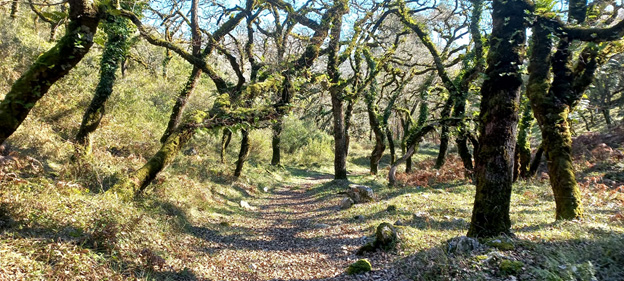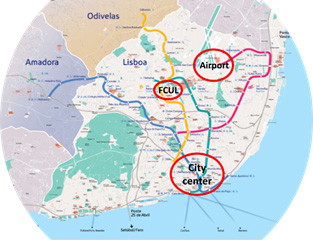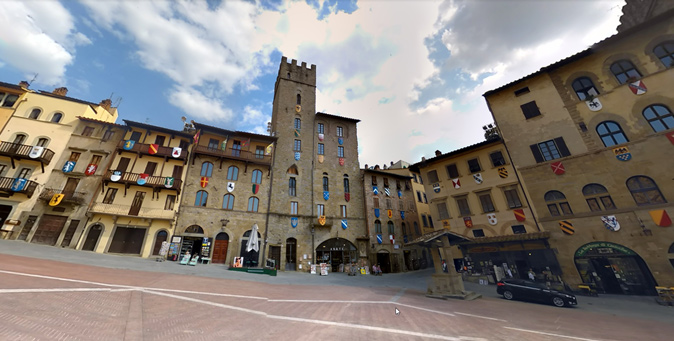“Interdisciplinary summer school on forest ecosystems Technologies-Biodiversity-Modelling”
Aim & Objectives:
The increasing rate of changes in environmental conditions cause higher pressure on science to provide robust estimates of future ecosystem development. We need robust approaches to measure the current state, understand the processes and then accurately predict the development of forest ecosystems. In this view, the members of three COST Actions (3DForEcoTech, Bottoms-up, PROCLIAS) joined forces to develop research and training activities to link forest dynamics models with modern technologies and comprehensive biodiversity data.

In regards to multi-taxon forest biodiversity, participants will have a comprehensive view on exploring the multiple facets of diversity. Participants will be guided from biodiversity theory, field sampling up to data analysis, by exploring different approaches to link biodiversity measures to ecosystem structure and functioning.
Three keynote speakers will present the most recent advances in the following topics:
- Caio Graco-Roza (University of Helsinki, Finland): "From Patterns to Action: Leveraging Beta Diversity for Ecological Understanding and Conservation"
- Arne Pommerening (Swedish University of Agricultural Sciences, Sweden): ” What does the mingling-size hypothesis mean for forest ecology and management?”
- Carlo Ricotta (Sapienza University of Rome, Italy):” Functional diversity: the concept and the measurement”
Other forest and taxonomist experts will guide trainees into the technical and practical aspects of collecting and analyzing biodiversity data:
- Paolo Giordani (University of Genoa, Italy): Lichen diversity sampling;
- Alessia Portaccio (University of Padua, Italy): Avian diversity sampling;
- Sabina Burrascano (Sapienza University of Rome, Italy): Vascular plant sampling;
- Francesco Chianucci (CREA - Research Centre for Forestry and Wood, Italy): Processing forest structure and diversity data using R tools.

In regards to close-range technologies, within this summer school, we will introduce the theory and practical work with an emphasis on the analysis of 3D point clouds from terrestrial-based sensors. You will work with technologies such as terrestrial laser scanning, mobile laser scanning, as well as photogrammetric methods. However, the emphasis will be on processing point clouds and using state-of-the-art solutions.

In regards to forest modelling, participants will have a general introduction to empirical and process-based forest modeling. They will create an empirical model using biodiversity observations and use an individual and process-based forest ecosystem model for simulating forest growth under different scenarios and apply the built empirical model on the results.
During the summer school, we will organise a poster session on the participants’ current research interests, and the work will stimulate open exchange and discussion between students and trainers.
Target Audience:
This summer school is designed for PhD candidates and postdocs from a variety of research fields.
How to apply?
We have approximately 40 places available for this summer school spread across the three topics. Please apply through the form by March 31st, 2023. Each applicant is requested to upload (i) a short motivation letter, (ii) a one-page CV and (iii) a 300-word abstract of the participants’ current work. The organising committee will use this information to decide which candidates will be accepted. Decisions on participation will be communicated in the second half of April 2023.
When & Where? 10/7/2023 – 14/7/2023, Ljubljana, Slovenia
Venue: Slovenian Forestry Institute (Večna pot 2, 1000 Ljubljana)
Participation fee & support: No registration fee. COST actions 3DForEcoTech, BOTTOMS-UP and PROCLIAS will reimburse the costs of selected participants’ travel, accommodation and subsistence. Only applicants from COST countries (https://www.cost.eu/about/members/) are eligible for reimbursement. The costs will be reimbursed only after the completion of summer school. Students from outside these countries can also apply, but they have to use their own funding.
Keynotes
Caio Graco-Roza (University of Helsinki, Finland)
Markus Eichhorn (University College Cork, Ireland)
Katarína Merganičová (Czech University of Life Sciences Prague, Czech Republic)
Mats Mahnken (Potsdam Institute for Climate Impact Research, Germany)
Arne Pommerening (Swedish University of Agricultural Sciences, Sweden)
Carlo Ricotta (Sapienza University of Rome, Italy)
Yunsheng Wang (Finnish Geospatial Research Institute, Finland)
Local organisers
Erika Kozamernik, Mitja Skudnik, Gal Kušar, Luka Krajnc and Anže Martin Pintar
Organisers & Trainers:
BOTTOMS-UP COST Action
Sabina Burrascano (Sapienza University of Rome, Italy)
Francesco Chianucci (CREA – Research Centre for Forestry and Wood, Italy)
Alessia Portaccio (University of Padua, Italy)
Paolo Giordani (University of Genoa, Italy)
3DForEcoTech COST Action
Martin Mokroš (Czech University of Life Sciences Prague, Czech Republic)
Carlos Cabo (University of Oviedo, Spain)
Louise Terryn (Ghent University, Belgium)
Kim Calders (Ghent University, Belgium)
Emily Lines (University of Cambridge, UK)
PROCLIAS Cost Action
Laura Dobor (Czech University of Life Sciences Prague, Czech Republic)
OlaIla Díaz-Yáñez (ETH Zurich, D-USYS, Forest Ecology, Switzerland)
Katarína Merganičová (Czech University of Life Sciences Prague, Czech Republic)
Mats Mahnken (Potsdam Institute for Climate Impact Research, Germany)
Hashtag ideas
#COSTForestSchool
#SuperSchool4Forests
#InterDistForestSchool
#IDSchool4Forests
#TechBioModel
#TechBiodivModelling
TRAINING SCHOOL
“INNOVATIVE TOOLS TO ANALYSE SPECIES-ENVIRONMENT RELATIONSHIPS OCTOBER 4-5TH, GRENOBLE, FRANCE”

Maya Guegen (CNRS, LECA – Grenoble, France): Species distribution models using the R package Biomod
Bjorn Reineking (INRAE, Lessem – Grenoble, France): Analysing species movement data
Marc Ohlmann (CNRS, LECA – Grenoble, France): Multi-species modelling using networks and graphical modelling
Robert Muscarella (Uppsala University – Sweden): Species distribution models: from theory to application.

The COST Action Bottoms-Up organizes its third Training School on “Innovative tools to analyse species-environment relationships”, which will be held in Grenoble / Saint Martin d’Hères (France) on October 4-5th, 2022.
Analysing the relationships between species and their environment has long been a challenge for researchers as well as managers of natural areas. However, it is crucial to use sound and unbiased tools to provide results that could be useful to understand species behaviour and inform environmental policies and management. Over the last decade, different statistical tools have been developed and tested over biodiversity datasets, some of which will be presented during the training school. Interventions will comprise lectures and computer practical works.
We invite researchers to express their interest to participate as trainees. Participation in the Training School will be free of charge for all trainees, but it is limited to up to 35 trainees. Selected trainees who are located in one of the 32 countries that are either COST members or near neighboring countries can be reimbursed for their long-distance travel and through a 180€ daily allowance, see reimbursement conditions here.
Please, express your interest to participate as a trainee by sending an email to the Action Chair (Sabina Burrascano), to the training school coordinator (Francesco Chianucci) and to the local organizer (Yoan Paillet) by the 27th of July 2022. Priority will be given to young researchers (from PhD students to post-docs with up to 8 years of experience after their PhD). We aim at making the application process as lightweight as possible. Your application (form: https://forms.gle/RemXuNdw3eifqrML7) should include your name, current affiliation, current status (in particular with respect to your PhD), and a list of relevant publications (if any). Add a very brief motivation why you want to attend and declare if your participation is dependent on receiving financial support from the COST Action.
Contacts:
Action chair -
Training school coordinator -
Local Organizer -






